de Nicaragua
F.C.N.
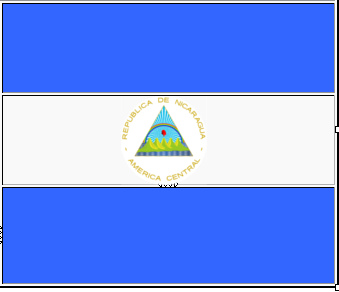

| Central America | |||||||||
| Ferrocarril | Nicaragua | Railroad | |||||||
| nicatrenes.com | |||||||||
| Ferrocaril de Nicaragua F.C.N. |  |  |
| Vistas del Tren, Managua a León Visión de un fotógrafo, a través de la lente de la cámara. Fotografías por Michael Fuery | Views from the Train, Managua to Leon A photographer's view through the camera lens Photographs by Michael Fuery |
| 1986 | |
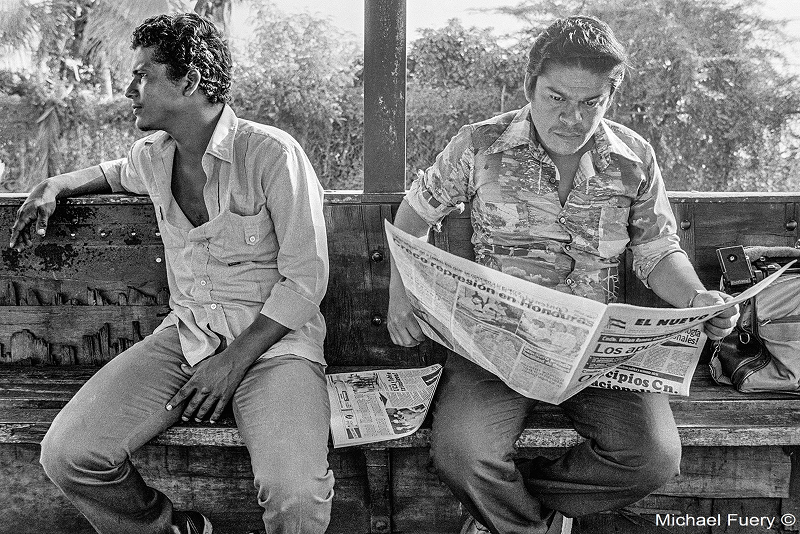 | |
Fotografía tomada el 21 de agosto de 1986 en el tren de Managua a León. / Fotógrafo; Michael Fuery / *Información dada con fotografía por Michael Fuery; Disfruté del viaje en tren, el tren no viajé muy rápido y fue una buena manera de ver el campo/paisajes entre Managua y León. / *Nota por nicatrenes; En esta foto, tenemos la sensación de lo que era viajar en el tren, en un vagón de tercera clase. Este es un vagón de tren de pasajeros, con techo, pero los lados están abiertos, no hay paredes en los lados, por encima de la altura del respaldo de los asientos. Al igual que el vagón que se exhibe actualmente en el Museo del Ferrocarril de Granada. / Observe la madera dura del banquillo, y qué deteriorado la madera está en el respaldo del asiento / Nicatrens enormemente aprecia y da gracias al "Sr. Michael Fuery" por permitir a nicatrenes, usar una copia de esta fotografía. / El Sr. Michael Fuery es un fotógrafo profesional; ha fotografiado documentales en muchos países en todo el mundo. / El Sr. Michael Fuery ha añadido 216 fotografías a Flickr en; flickr.com/photos/ michaelfuery101 | Photo taken August 21, 1986 on the train from Managua to León" / Photographer; Michael Fuery / *Information given by Michael Fuery with the photograph; I enjoyed the train journey, the train didn't travel very fast and it was a good way to see the countryside between Managua and León. / *Note by nicatrenes; In this photo, we get the sensation of what it was like to ride the train, in the third class coach. This is a passenger railway car with a roof, but the sides are open, there are no walls on the sides, above the height of the backrest of the seats. Just like the railway car presently displayed at the Granada Railroad Museum. / Notice the hard wooden bench seat and how deteriorated the wood is in the backrest of the seat. / Nicatrens greatly appreciates and gives thanks to "Mr. Michael Fuery" for permitting nicatrenes, to use a copy of this photograph. / Mr. Michael Fuery is a professional photographer; he has photographed documentaries in many countries throughout the world. / Mr. Michael Fuery has 216 photographs in Flickr at; flickr.com/photos/ michaelfuery101 |
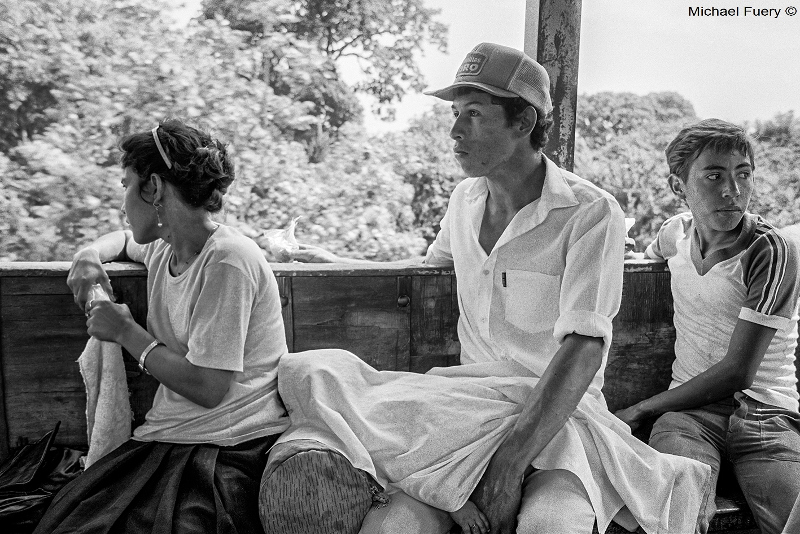 | |
| Fotografía tomada en el tren de Managua a León. / Fotógrafo; Michael Fuery / Fecha; 21 de agosto de 1986 / La brisa era agradable, mientras se viajaba en estos coches del ferrocarril abiertos, era un respiro agradable del clima tropical, es muy caliente en Nicaragua, excepto durante el invierno cuando la temperatura es 20 grados más fresco. // Observen al niño cubierto con una tela, protegiendolo de los elementos, el polvo volante era común en este tipo de vagón abierto de ferrocarril. / También podemos observar las bolsas de plástico en las manos de los pasajeros, éstos se llaman "helados" (sabores de jugo congelados). / Este tipo de alimentos fueron vendidos por individuos, que ofrecían sus mercancías a los pasajeros, llevándolo hasta las ventanas de los vagones o ellos entraban dentro de los vagones, en las paradas ferroviarias programadas. / Casi todos los pasajeros que habían montado en el Ferrocarril de Nicaragua, han contado de la nostalgia, con entusiasmo y gran cariño, de cómo anhelaban consumir estos deliciosos artículos producidos localmente. Que sólo podían adquirirse en ciertas estaciones de ferrocarril. / Los deliciosos sabores provenían de los ingredientes y recetas, que eran característicos de cada región terrestre local. Estas delicias eran muy deseables. / Nicatrens enormemente aprecia y da gracias al "Sr. Michael Fuery" por permitir a nicatrenes, usar una copia de esta fotografía. / El Sr. Michael Fuery es un fotógrafo profesional; ha fotografiado documentales en muchos países en todo el mundo. / El Sr. Michael Fuery ha añadido 216 fotografías a Flickr en; flickr.com/photos/ michaelfuery101 | Photo taken on the train from Managua to León / Photographer; Michael Fuery / Date; August 21 of 1986 / The pleasant breeze while riding in these open railroad cars, was a pleasant reprieve from the hot tropical climate! In Nicaragua the weather is a very hot, except during the winter when the temperature is 20 degrees cooler. // Notice the child covered with a cloth, protecting the child from the elements, flying dust and debris was common when riding in this type of open railroad car. / We can also observe plastic bags in the passengers hands, these are called "helados" (frozen juices). / These type of foods were sold by individuals who would offer their wares by bringing it up to the windows of the railcars, or they would come inside the railcars, at the scheduled railroad stops. / Almost all the passengers who have ridden on the Railroad have expressed with nostalgia; How they loved to consume the delicious foods, which could only be purchased at certain railroad stations. / The delicious flavors came from the ingredients and recipes, which were characteristic to each local land region. These delicacies were very desirable. / Nicatrens greatly appreciates and gives thanks to "Mr. Michael Fuery" for permitting nicatrenes, to use a copy of this photograph. / Mr. Michael Fuery is a professional photographer; he has photographed documentaries in many countries throughout the world. / Mr. Michael Fuery has 216 photographs in Flickr at; flickr.com/photos/ michaelfuery101 |
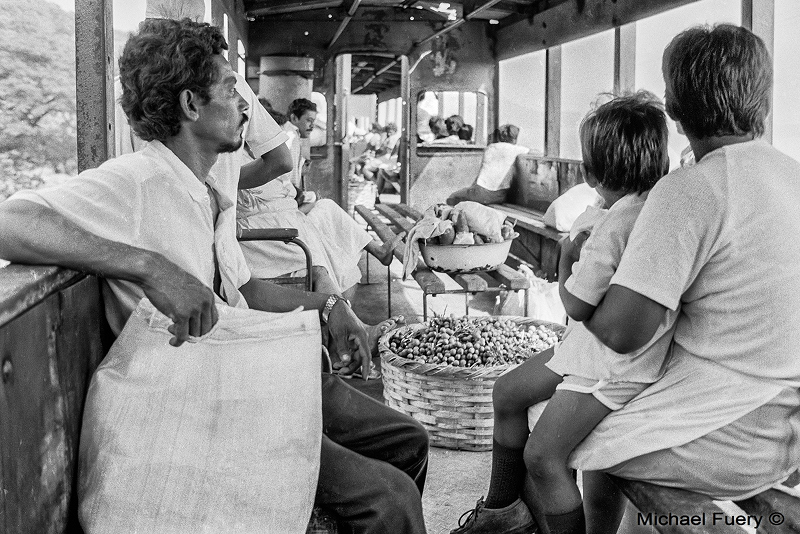 | |
| Fotografía tomada en el tren de Managua a León. / Fotógrafo; Michael Fuery / Fecha; 21 de agosto de 1986 / El ferrocarril era muy complaciente a los individuos que deseaban transportar mercancía de todos tipos y tamaños. / En esta fotografía podemos ver a un vendedor de frutas, que esta transportando una gran canasta llena de "Mamones". (La fruta conocida en Nicaragua como Mamones es botánicamente referida como “Melicoccus bijugatus” o a veces como “Melicocca bijuga”). / El ferrocarril brindaba a las personas la oportunidad de traer mercancía que se producía localmente, para vender (o trueque) a los mercados más grandes, de los centros más densamente poblados. / El ferrocarril era un medio de transporte confiable y de bajo costo. Con una inversión financiera muy pequeña, de un pasaje en el tren; los emprendedores tuvieron la oportunidad de aumentar las ventas. / Sin el ferrocarril, grupos e individuos de las zonas rurales menos pobladas, fueron limitados para vender (o trueque) sus bienes y servicios a los mercados pequeños, limitados por los locales rurales. / El cierre del ferrocarril nicaragüense en 1994, fue un golpe devastador para muchas personas que los medios de subsistencia dependían de la ruta del ferrocarril. // Nicatrens enormemente aprecia y da gracias al "Sr. Michael Fuery" por permitir a nicatrenes, usar una copia de esta fotografía. / El Sr. Michael Fuery es un fotógrafo profesional; ha fotografiado documentales en muchos países en todo el mundo. / El Sr. Michael Fuery ha añadido 216 fotografías a Flickr en; flickr.com/photos/ michaelfuery101 | Photo taken on the train from Managua to León" / Photographer; Michael Fuery / Date; August 21 of 1986 / The railroad was very accommodating to individuals wanting to transport all types and sizes of merchandise. / In this photograph we can see a fruit seller transporting a large basket filled with “Mamones”. (This fruit known in Nicaragua as "Mamones" is botanically referred to as “Melicoccus bijugatus” or sometimes as “Melicocca bijuga”). / The railroad afforded persons an opportunity to bring merchandise that was produced locally and sell (or trade) to the larger markets, located in the more densely populated centers. / The railroad was a dependable low cost means of transportation. With a very small financial investment, for a train ticket; entrepreneurs had the opportunity for increase sales. / Without the railroad, individuals and groups from the less populated rural areas, would have been limited to sell (or barter) their goods and services in the smaller limited local markets / The closure of the Nicaraguan railroad in 1994, was a devastating blow to many persons whos livelihoods depended on the railroad’s route. // Nicatrens greatly appreciates and gives thanks to "Mr. Michael Fuery" for permitting nicatrenes, to use a copy of this photograph. / Mr. Michael Fuery is a professional photographer; he has photographed documentaries in many countries throughout the world. / Mr. Michael Fuery has 216 photographs in Flickr at; flickr.com/photos/ michaelfuery101 |
| Estación de Ferrocarril de León | Railway Station of León |
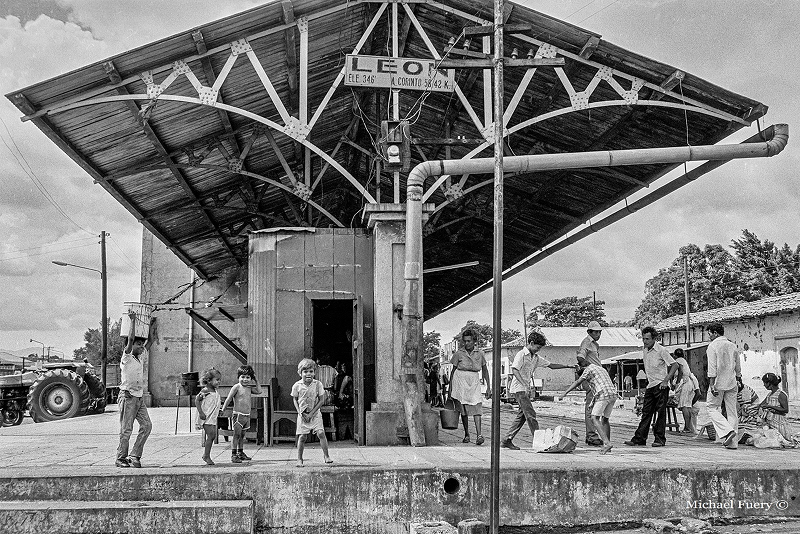 | |
| Foto tomada en la Estación de Ferrocarril de León. / Fotógrafo; Michael Fuery / Fecha; Agosto de 1986 / Esta fotografía ha capturado la estación ferroviaria de León durante uno de sus momentos relajados, nada comparado con la gran conmoción, cuando el tren ha llegado a la estación. / Los niños son juguetones; cada uno parece disfrutar de la ambiente relajada. / Hay un tractor en el lado izquierdo de esta imagen, y más detrás del tractor es un gran remolque o camión. Estos vehículos nos dan una pista de la gran cantidad de carga que el ferrocarril habría transportado. / Los tirantes del tejado metálicos originales, han durado en buenas condiciones, durante el paso del tiempo. La plantilla de este mismo soporte metálico de techo se puede ver en muchas de las estaciones de ferrocarril de Nicaragua, que tenía este tipo de techo con extensión protectora que sobresale. // Nicatrens enormemente aprecia y da gracias al "Sr. Michael Fuery" por permitir a nicatrenes, usar una copia de esta fotografía. / El Sr. Michael Fuery es un fotógrafo profesional; ha fotografiado documentales en muchos países en todo el mundo. / El Sr. Michael Fuery ha añadido 216 fotografías a Flickr en; flickr.com/photos/ michaelfuery101 | Photo taken at the León Railway Station. / Photographer; Michael Fuery / Date; August of 1986 / This photograph has caught the Railroad Station of León during one of its relaxed moments, it is nothing compared to the great commotion, when the train arrives in the station. / The children are playful and everyone appears to be enjoying the relaxed atmosphere. / There is a tractor on the left side of this picture, and further behind the tractor is a large trailer or truck. These vehicles give us a hint of the large amount of cargo the railroad would have transported. / The original metal roof braces, have endured in good condition, during the passage of time. The template of this same metal roof brace can be seen at many of Nicaragua’s’ railroad stations, which had this type of protective overhanging roof extension. // Nicatrens greatly appreciates and gives thanks to "Mr. Michael Fuery" for permitting nicatrenes, to use a copy of this photograph. / Mr. Michael Fuery is a professional photographer; he has photographed documentaries in many countries throughout the world. / Mr. Michael Fuery has 216 photographs in Flickr at; flickr.com/photos/ michaelfuery101 |
| Estación de Ferrocarril de León | Railway Station of León |
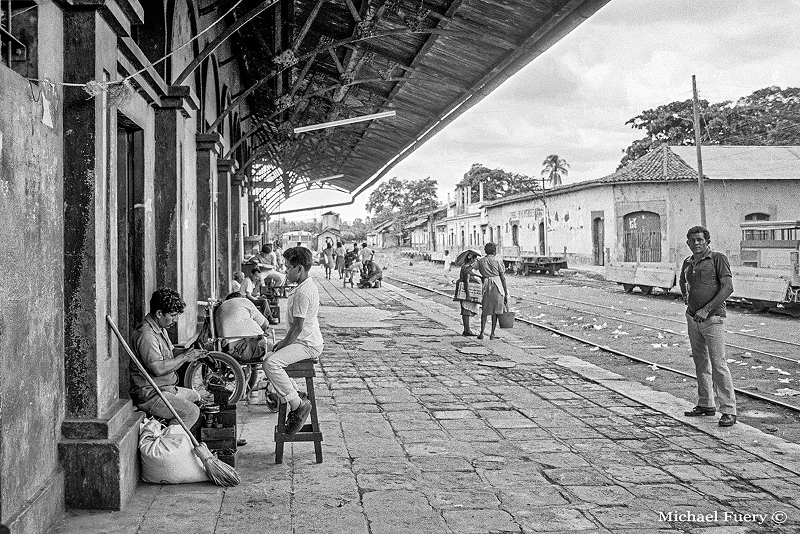 | |
| Foto tomada en la Estación de Ferrocarril de León. / Fotógrafo; Michael Fuery / Fecha; Agosto de 1986 / Una fotografía que mira a lo largo de la plataforma de la estación de León, que nos da una mirada a las muchas personas que esperan para vender sus mercancías y servicios. / Podemos ver al menos tres hombres lustradores de zapatos en la plataforma, esto habría sido necesario para el servicio rápidamente (en el corto tiempo que hubiera estado disponible), para atender rápidamente los muchos pasajeros que llegan. / También hay una señora lista para vender sus periódicos; parece que lleva muchos periódicos más en su cabeza. / Mirando el área que rodea la plataforma, en el lado derecho, hay muchos vagones de carga, esto da la impresión que el ferrocarril tuvo que mover una gran cantidad de la carga a través de esta ubicación. / No visto en esta foto, hay un inmenso almacén, junto a la estación de León, que el ferrocarril construyó en la década de 1930, con la expectativa de una enorme cantidad de carga. / Más allá del otro extremo de la plataforma; hay un "autocarril" (coche de pasajero auto-impulsado del ferrocarril), y mirando más lejos detrás, usted puede ver el tanque de agua que fue utilizado para rellenar las locomotoras del vapor. // Nicatrens enormemente aprecia y da gracias al "Sr. Michael Fuery" por permitir a nicatrenes, usar una copia de esta fotografía. / El Sr. Michael Fuery es un fotógrafo profesional; ha fotografiado documentales en muchos países en todo el mundo. / El Sr. Michael Fuery ha añadido 216 fotografías a Flickr en; flickr.com/photos/ michaelfuery101 | Photo taken at the León Railway Station. / Photographer; Michael Fuery / Date; August of 1986 / This photograph looking down the length of the León Station platform, gives us a look at the many persons waiting to sell their merchandise and services. / We can see at least three shoeshine men on the platform, this would have been necessary to quickly service the many arriving passengers in the short time that would have been available. / There is also a lady ready to sell her newspapers; she seems to be carrying many more newspapers on her head. / Looking at the area surrounding the platform, on the right side there are many empty cargo railway cars. This gives the impression that the railroad had to move a great amount of cargo through this location. / Not seen in this photo, is an immense warehouse, next to the León Railway Station, which the railroad built in the 1930’s, with the expectation for enormous amount of cargo. / At the far end of the platform; there is an “Autocarril” (self-powered passenger railway car), and looking farther behind, you can see the water tank, which was used to replenish the steam locomotives. // Nicatrens greatly appreciates and gives thanks to "Mr. Michael Fuery" for permitting nicatrenes, to use a copy of this photograph. / Mr. Michael Fuery is a professional photographer; he has photographed documentaries in many countries throughout the world. / Mr. Michael Fuery has 216 photographs in Flickr at; flickr.com/photos/ michaelfuery101 |
Bodega ferroviario de León | Railway Warehouse of León |
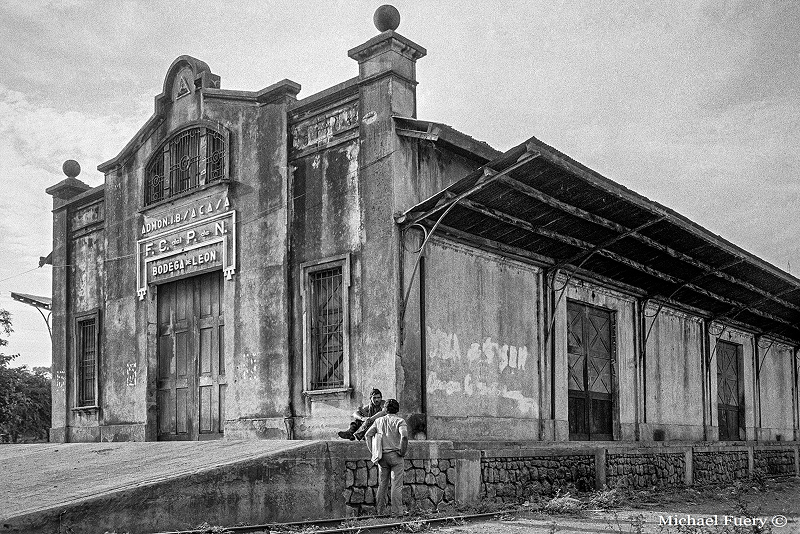 | |
| Fotografía del "Bodega de León" del Ferrocarril, en León, Nicaragua. / Fotógrafo; Michael Fuery / Fecha; 21 de agosto de 1986 // La "Bodega de León" en León, Nicaragua, del; Ferrocarril del Pacifico de Nicaragua (FC. del P. de N.), fue construida durante la administración de "El Presidente Dr. J. B. Sacasa S." (1933–1936). / Esta bodega surge como elemento clave dentro del proyectado “Ferrocarril del Septentrión”, que consistía en llevar el ramal "León" – "El Sauce" hasta la ciudad de Estelí. / En la ciudad de Estelí habría conectado con la "Carretera Panamericana". (La "Carretera del Pan American" es una carretera pavimentada que comienza de los “Estados Unidos” y sigue a través de todos los países centroamericanos.) / Se esperaba visionariamente la movilización de una enorme cantidad de carga procedente de esos puntos geográficos que necesitaría una gran bodega para colocar la misma. / Desafortunadamente este último paso estratégico de prolongación de la línea férrea hasta la ciudad de Estelí, no se logró concretar. / Nota; La construcción de la Carretera Panamericanano no alcanzó la ciudad de Estelí hasta el año de 1952, Su construcción se demoró debido a la Segunda Guerra Mundial. // La mayoría de esta información ha sido copiada de; Un comentario sobre un foto, por el Sr. Geral Contreras , del 3 de noviembre de 2015; (En Facebook al “Fotos antiguas de Leon Nicaragua” facebook.com/ fotosantiguasleon) /// Nicatrens enormemente aprecia y da gracias al "Sr. Michael Fuery" por permitir a nicatrenes, usar una copia de esta fotografía. / El Sr. Michael Fuery es un fotógrafo profesional; ha fotografiado documentales en muchos países en todo el mundo. / El Sr. Michael Fuery ha añadido 216 fotografías a Flickr en; flickr.com/photos/ michaelfuery101 | Photo of the ("Bodega de León"), The railway warehouse in León, Nicaragua. / Photographer; Michael Fuery / Date; August of 1986 // The railroad warehouse known as the "Bodega de León", in León, Nicaragua, was built during the administration of "President Dr. J. B. Sacasa S." (1933–1936), by the "Ferrocarril del Pacifico de Nicaragua" (FC. del P. de N.). / This enormous warehouse was conceived as a key element in the design of the railroad branch-line known as the “Ferrocarril del Septentrión”. / The design of the “Ferrocarril del Septentrión” was intended to include; extending the “León”-“El Sauce” branch-line, further out to the city of Estelí. / In Estelí the branch-line would have connected with the “Pan American Highway”. (The "Pan American Highway" is a paved highway starting from the “United States” and continuing through all the Central American countries.) / The design of this project had anticipated; to mobilize an enormous amount of cargo, through these geographical points, which required an enormous warehouse, to hold all the cargo. / Unfortunately this last strategic step to extend the branch-line to the city of Estelí, failedBodega to materialized. / Note; The construction of the Pan American Highway did not reach the city of Estelí until the year of 1952, its construction was delayed due to the Second World War. // The majority of this information has been copied from; A photo commentary by "Mr. Geral Contreras", from November 3, 2015; (in Facebook at “Fotos antiguas de Leon Nicaragua” facebook.com/ fotosantiguasleon) (Translated from Spanish by nicatrenes) /// Nicatrens greatly appreciates and gives thanks to "Mr. Michael Fuery" for permitting nicatrenes, to use a copy of this photograph. / Mr. Michael Fuery is a professional photographerhe, has photographed documentaries in many countries throughout the world. / Mr. Michael Fuery has 216 photographs in Flickr at; flickr.com/photos/ michaelfuery101 |
| ||||||||||||||||||||||||||||||||||||||||||||||||||||||